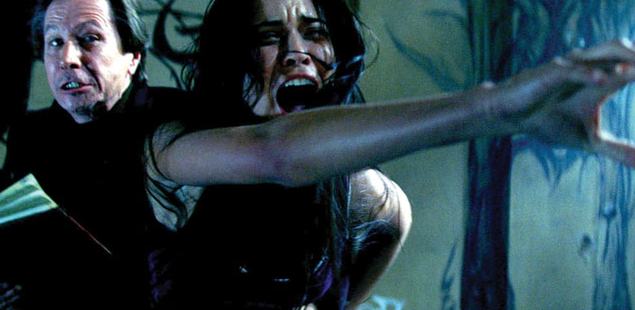
The Unborn (Movie Review)
Having sat through "The Unborn," it seems a virtual impossibility that writer and director David Goyer had any part in bringing either "Batman Returns" or "The Dark Knight" to the screen. So poor is the direction, so shoddy the performances, so unyieldingly boring the writing that part of me worries that the stench of this film will somehow taint my treasured memories of Batman's breathless heroics simply by association through a common creative presence. Part of me would like to report that "The Unborn" possesses some skeletal scraps of worthiness, something to redeem it from the level of utter unwatchability. Alas, as the film would have us believe of people, some films are a doorway: in this case one through which intolerable mediocrity — which is far worse than outright awfulness — is allowed to pass.
Like many spineless PG-13 horror films, this one may have at one time resembled a movie with potential. The underlying premise — that an evil spirit was allowed to enter our world through the death of a mistreated child, and that once vanquished by the child's twin sister, that demon then haunted the woman's bloodline — is not far removed from any number of greater films. The wrinkle here comes from the fact that the possessed twin was a young boy forced to undergo experiments in Auschwitz during the Holocaust. His sister survives to give birth to a woman who eventually commits suicide leaving behind a daughter who was herself a twin while still in utero. From there it all becomes a little confused.
The haunting of our protagonist, Odette Youstman as Casey or much more annoyingly, "Case," begins in the very first scene, a dream sequence; one of several throughout the movie. Casey encounters a young boy as well as a dog with a human mask on, and this sets her on a quest that eventually reveals her maternal grandmother, the Holocaust survivor, and the lineage of terror — TERROR I SAY — that is destined to be Casey's life. For what felt like days, but was in fact only about 40 minutes, "The Unborn" seems not to move. In the second scene a creepy child that Casey is babysitting mutters some creepy words. Casey's eyes start changing color, and then it is really on.
And by on I mean that she wanders around the outrageously plush suburbs and scenic downtown vistas of Chicago with her huggable beau. Sure the ghost shows up to scare her a few times, most notably in a posh club — because where better to hang when you're being haunted. Once the audience has been lulled to sleep, Goyer gets around to introducing Gary Oldman, who we all know from the trailer is going to perform an excorcism at some point. Just before she is offed by the pesky demon, the Holocaust surviving grandmother instructs Casey to seek out Oldman's Rabbi Sendak. The two meet in what to me was the most hilarious of many unintentionally hilarious scenes. Toting a priceless mystical book that she somehow smuggled out of a library's rare book room, Casey shows up at one of Sendek's 12-step meetings. Insisting she's not crazy she asks this man, the only one who can help her, for an exorcism. Yet the amazing Sendak essentially asks her what the hell she is talking about.
This monumentally anti-climatic exchange leads to more aimless fretting, and eventually a death. This all leads to an exorcism, performed by Sendak, the criminally underused Idris Elba, and eight other volunteers who we can only assume responded to a Craigslist posting in the always popular "Religious Ceremony Participant" section. There's some mild violence, and then the whole thing is over, except of course for the required twist ending — here even more aggressively stupid than in most ghost stories.
I had actually hoped that writing this review would help me to appreciate the sheer inanity of "The Unborn" if for nothing else than the few chuckles that I could wring out of its ineptness. Unfortunately, that has not been the case. Instead it has thrown into relief the moments that transcended harmless idiocy to become borderline offensive. Of course, this is a Hollywood product, so I don't mean offensive to our sensibilities — that would actually be welcome, if only as a challenge — but to our intelligence. There is not a single character in "The Unborn" who behaves as a real human might actually behave. There is not a single action undertaken that seems to come from considered thought. Instead, we are given half-baked spiritual garbage drawn seemingly whole from Jewish mysticism.
The one interesting element of "The Unborn" would have been its use of tropes from Kaballah, and even traditional Judaism, as opposed to the more standard Christian stories and symbols that typically drive possession films, but, for me at least, it was all badly undermined by the ill-advised decision to bring the Holocaust into the equation. Surely the modern history of Judaism cannot be told without the addressing the sublime horror of the Holocaust, but "The Unborn" isn't a film about Judaism — though it may be about belief in some watered down sense — and it certainly isn't a film about the Holocaust. So by trying to tie-in the events that took place at some Nazi death camps, "The Unborn" violates the cinematic or narrative corollary of Godwin's Law. The story could just have easily tread the same path with a slight adjustment, but Goyer went for the full Hilter monty, and in so doing robbed the film of any chance at legitimacy.

